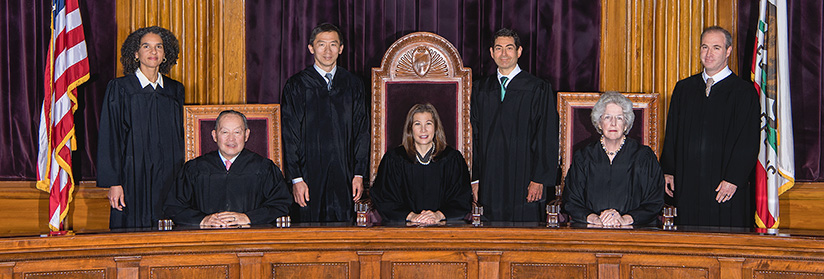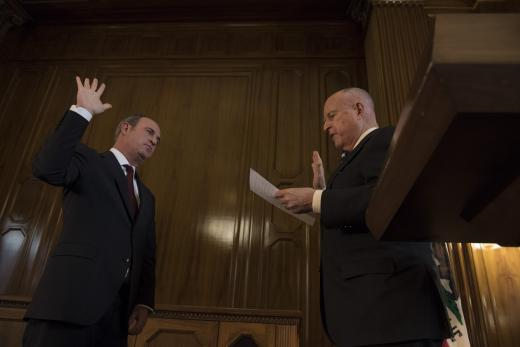
California Supreme Court Justices (courts.ca.gov)
CA Supreme Court Undermines Independent Worker Test Ruling it Retroactive
Ruling clears way for lawsuits
By Evan Symon, January 15, 2021 2:25 am
On Thursday the California Supreme Court ruled that the “ABC” test for finding independent contractors and workers under the AB 5 law is now to be considered retroactive.
Under AB 5, the ABC test, first clarified in the 2018 Dynamex ruling, workers must answer yes to being “free from the control and direction of the hiring entity in connection with the work’s performance,” must do work that is not usual in the business, and must have an independently established job that is being done under the work being done for the business. If a worker doesn’t fall under all three, they are to be considered an employee and not an independent contractor, opening them to full benefits and pay as an employee of the company.
The ABC test was brought under fire in 2020, with AB 5 itself being considerably weakened by having many initial businesses being covered under the new law being exempt. The biggest blow to AB 5 came in November when Proposition 22 was passed by voters of California and subsequently made all rideshare companies exempt from the law.
Since then, many groups have been trying to overturn Prop 22 in court. However, despite the worker classification itself being the major issue, the controversy over the ABC test continued on in the state Supreme Court.
Thursday’s case brought to the state Supreme Court by workers of Jan-Pro Franchising International against the company, was ultimately decided to be in the workers favor. Despite the weakening of AB 5 and the passage of Prop 22, workers can now continue to sue companies from being wronged by the ABC all the way back to cases in 2018, with companies remaining liable for any violations made since then.
“In light of the general rule of retroactivity of judicial decisions and the fundamental importance of the protections afforded by the state’s wage orders, we find no compelling justification for denying workers included in such lawsuits the benefit of the standard set forth in
Dynamex,” explained Chief Justice Tani Cantil-Sakauye.
Law experts noted the importance of the passage on Thursday.
“This is pretty big, and it is probably making companies like Lyft and DoorDash nervous tonight,” former business attorney Mel Greenburg told the Globe. “What happened was that the test is now retroactive, meaning that any cases where prior rulings or exemptions were given, like Prop 22, it is all clear for them. So if a company unfairly put down an employee as a contractor instead of an employee, say, in April 2019, against what the ABC test said to do, they are liable. So, say for rideshare companies, nothing now protects them for lawsuits if such a thing happened between the time the ABC test was made legal to when Prop 22 came into effect. It’s a big window.”
It is unknown as of Thursday if the case will be appealed to a higher court.
- Gov. Newsom Files FOIA Request To ‘Expose True Cost’ Of L.A. Federal Troop Deployment for Anti-ICE Riots - August 6, 2025
- California Redistricting: How Newsom’s Plan Will Demolish Hard Fought GOP Gains - August 6, 2025
- CDCR To Close California Rehabilitation Center In Riverside County Next Year - August 6, 2025








More state businesses leave in three, two….
Even in California Law there are four employment classifications, not two: common law employee, statutory employee, statutory nonemployee, and independent contractor. The IRS recognizes all four.
Because the Employment Attorney Lobby is looking to increase its own work and compensation, AB5 missed the most obvious solution: it should have argued to reclassify contractors as Statutory Employees, not Common Law employees. It would have been a win-win all the way around except for crony billable hours.
Statutory Employees are a hybrid. They don’t fall under FLSA so they set their hours and time by mutual agreement kind of like a contractor. There is no overtime. The Employer and employee split the payroll tax, but they don’t participate in Unemployment. They do participate in State Disability. Worker’s Compensation is not mandatory if in State Fund but might be required to be extended if required by a private carrier. Statutory Employees without W/C retain their standing to sue for workplace injury just like a contractor.
I am sure that the 9th circuit judges fall asleeep at night thinking they have improved society that day. I have delusions too.
Another major chunk of Lorena Gonzalez’s malignant AB5 legislation is chipped away. Maybe the rest of her constituents will get the message, ignore their union bosses’ advice, and not reelect her to her Sacramento sinecure.